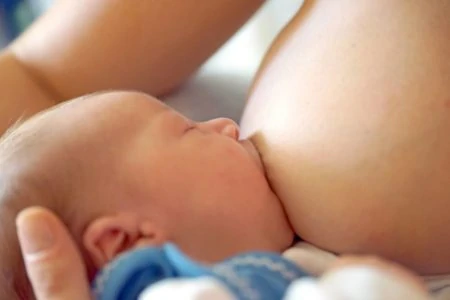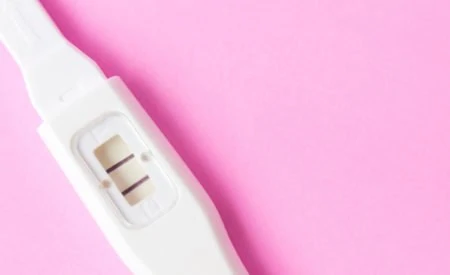Are you wondering if breastfeeding can double as your birth control? Or maybe you’re trying to get pregnant but wonder if breastfeeding is holding you back.
Many myths persist about how breastfeeding, fertility, and ovulation are connected.
We’ve studied the most recent research, and in this article, our medical experts will help you take a closer look at how your hormones continue to change as you breastfeed and how these changes affect your fertility.
We’ll also examine what you can do to either start or stop your chances of becoming pregnant while breastfeeding.
Key Takeaways
- Breastfeeding can act as a natural form of birth control due to the hormone prolactin, which suppresses ovulation, especially when exclusively breastfeeding.
- Fertility signs while breastfeeding include the return of your menstrual cycle, changes in cervical mucus, and experiencing common side effects of ovulation and menstruation.
- To improve fertility while breastfeeding, limit nursing and use a breast pump, check for a luteal phase defect, and try to reduce stress.
- Consult a doctor if your period doesn’t return within three months after stopping or reducing breastfeeding, or if you experience concerning symptoms like severe pain, excessive bleeding, or trouble breathing.
Your Menstrual Cycle
The menstrual cycle occurs regularly as part of female reproduction (1). While many refer to this cycle as menstruation or a period, it encompasses a number of stages, including menstruation and ovulation.
A woman’s ovary releases an egg during the ovulation period. The egg then travels into the fallopian tube to await fertilization. The womb becomes thick with a lining to house the egg. If sperm fertilizes the egg and it successfully implants in the uterus, you become pregnant.
The womb sheds its lining if the egg is not fertilized and menstruation begins.
Knowing What’s Normal For You
Tracking includes marking down the days you have your period, bodily changes (such as charting temperature and cervical mucus changes), personal symptoms (such as cramping and moodiness), and signs of ovulation.
How Your Cycle Changes After Pregnancy
During pregnancy, the menstrual cycle completely stops as your little one grows and develops. After pregnancy, the reemergence of your menstrual cycle will be largely determined by breastfeeding.
Why is this? The hormone necessary for breast milk production suppresses ovulation (2).
Take Note
For all other mothers who breastfeed but supplement with formula or who have older babies trying out new foods in addition to breast milk, the timing of the first menstrual cycle will vary.
Understanding Your Breastfeeding Hormones
During pregnancy and throughout your postpartum experience, you will experience many hormonal fluctuations. While you may feel these changes were simply designed to drive you crazy, they have a very real effect on your body’s ability to care for your baby.
These are the hormones we will discuss:
- Prolactin.
- Estrogen.
- Progesterone.
- Oxytocin.
Your body uses the hormone prolactin to produce breast milk. The very name of this hormone comes from its importance to lactation. Prolactin is also the mothering hormone — creating those protective feelings you have toward your baby.
Prolactin is produced in the pituitary gland and begins secreting into your body eight weeks into pregnancy. The levels slowly rise, peaking at your baby’s birth.
However, your body also produces high levels of estrogen and progesterone, which are known as “the pregnancy hormones.” These prevent the high prolactin levels from causing your milk to be produced and flow right out throughout your pregnancy.
The pregnancy hormones drop dramatically at birth, allowing the prolactin to fully activate and breast milk to start flowing. Oxytocin begins to be produced at this stage. While oxytocin was the primary hormone of birth — contracting your uterus and helping your baby into the world — its role changes for breastfeeding.
Oxytocin is also created in the pituitary gland. Its primary role is to deliver the milk the prolactin has signaled to be produced. Milk will release from the milk-making glands when oxytocin signals to the breast that more milk needs to come out.
These hormones work together to ensure both your pregnancy and your breastfeeding experience go smoothly.
How Prolactin Affects Fertility
Of all these hormones, prolactin is the one that has the most direct impact on your fertility.
Ovulation occurs when the gonadotropin-releasing hormone signals to another hormone, the follicle-stimulating hormone, to release an egg for fertilization and prepare the womb to house it.
Prolactin suppresses both of these hormones, effectively stopping ovulation, the key step in the menstrual cycle for reproduction. This is why so many women are able to use breastfeeding as a natural form of birth control.
In fact, less than 1 out of 100 exclusively breastfeeding women will become pregnant in the first six months.
Birth Control and Breastfeeding
While it is clear breastfeeding is an effective form of birth control, experts urge women to remember two things:
- Exclusive breastfeeding, sometimes referred to as continuous breastfeeding, is the key to prolactin’s success in suppressing ovulation. Exclusive breastfeeding is when you only give your baby breast milk without any other liquids, including water. Pumping also makes breastfeeding less effective as a form of birth control.
- Breastfeeding is temporary as a birth control method and can only be relied upon for six months at the most. At the six-month mark, you will likely begin introducing other foods into your baby’s diet.
If your goal is to prevent pregnancy, you should be very careful when using breastfeeding as a form of birth control. Because ovulation occurs before menstruation, you will not know if you are experiencing a fertile period before your period returns.
The best way to ensure breastfeeding works is to exclusively breastfeed and use a backup form of birth control if you can answer yes to any of these questions:
- Is your baby older than 6 months?
- Has your period returned?
- Are you supplementing breastfeeding with bottles of formula or pumped milk, or has your baby started solids?
How to Exclusively Breastfeed
Even though the World Health Organization (WHO) recommends exclusive breastfeeding for the first six months of your baby’s life, only 32 percent of women who attempt to exclusively breastfeed for three months reach their goal.
If you hope to exclusively breastfeed, better your chances of success by following these tips:
- Education: Learn as much as you can about breastfeeding before your little one arrives. This will help you feel more confident and prepared once you give birth.
- Consultation: Make full use of the lactation consulting you receive in the hospital after your baby is born. If you are able, have a lactation consultant come and visit you in your home to help ensure you and your baby are having the best breastfeeding experience possible.
- Avoid Supplements: The key to exclusive breastfeeding is ensuring no other food or liquid is introduced into your baby’s diet. This includes formula (unless medically necessary) and water.
- On-demand: Breastfeed as often as your baby wants — day and night. Because breast milk production is often determined by frequency and stimulation, it is important to feed frequently. Aim for 8-12 feedings per 24 hours.
- Feedings at night: Prolactin levels are the highest at night. If you are able, nursing or pumping at night will help increase your prolactin levels.
- Bottles: Do not use bottles or pacifiers. Oxytocin is stimulated by the sucking motion from your baby’s mouth on the breast.
Pro Tip
Fertility Signs While Breastfeeding
If you are hoping to become pregnant again, breastfeeding can become a confusing problem. While you want your baby to enjoy the benefits of breast milk for as long as possible, the hormones involved with breastfeeding reduce your chances of becoming pregnant.
According to WHO, mothers are recommended to breastfeed for up to two years and beyond (3). They also suggest waiting for two years after giving birth to have another child. Not spacing out your births can increase your odds of premature birth, as spacing them gives your body time to recover from the strain of pregnancy.
However, every family is different, and choosing when to add another child to your family is a very personal choice influenced by a host of factors. Regardless of the timeline, it is important you recognize the signs of fertility while breastfeeding.
1. Return of Your Menstrual Cycle
If your menstrual cycle has resumed, you may be ovulating, which will increase your chance of becoming pregnant. If you want to understand your cycle better, we suggest tracking your period with an app on your phone or computer.
Record your period days, symptoms, and more. You will then be able to discover when you are ovulating and the days you are most likely to become pregnant if you have unprotected sex.
2. Cervical Mucus
Fertile women will notice a change in their cervical mucus when they are ovulating. Sperm needs a specific type of cervical mucus to thrive.
If your cervical mucus becomes clear and wet, often described as the consistency of egg whites, there is a good chance you are currently ovulating or within a few days of ovulating.
You can expect thick, sticky cervical mucus in the days leading up to the ovulation phase. It is a preparatory mucus, meaning sperm can remain inside it, but it is too thick for sperm to move through.
After ovulation, your cervical fluid will lessen and become thicker. Right before you menstruate, you will likely experience fluid that is typically white, thick, and even glue-like (4).
3. Other Signs
Common side effects of ovulation and menstruation are breast tenderness, nausea, cramping, and headaches. If you notice the return of these symptoms, it is a good indicator your body is beginning to resume its monthly cycle.
Some women experience these signs for a few months before their period resumes. This is a good sign your body is transitioning back to full fertility (5).
In my experience, women do not pay enough attention to their cervical mucus. This is one way to catch a fertile time before that first period occurs after giving birth.
Editor's Note:
Michelle Roth, BA, IBCLCHow to Improve Fertility While Breastfeeding
If you would like to improve your chances of becoming pregnant while breastfeeding, there are a couple of things you can do.
First, limit the number of times you nurse throughout the day, and focus on using a breast pump. This will help decrease the amount of prolactin in your system while still producing breast milk.
A slow transition will be easier for your baby, but a more dramatic change in your nursing schedule will help you reach full fertility more quickly.
Second, it can be important to rule out a luteal phase defect. The luteal phase takes place after ovulation and is the time of your menstrual cycle when the lining of your uterus becomes thicker and prepares to implant a fertilized egg.
Because progesterone levels are often low when breastfeeding, the luteal phase can be shortened. This means there is often not enough time for the fertilized egg to safely implant itself in your womb before menstruation occurs.
Finally, relax and give yourself some time! Stress often disrupts fertility (6). Unless you are facing other medical issues, your menstrual cycle will return to normal with time.
When to See a Doctor
In some instances, complications can arise with the return of your menstrual cycle. If you have stopped breastfeeding or dramatically limited how much you breastfeed and your period has not returned within three months, you may want to visit your doctor.
If your period has returned and you experience any of the following symptoms, go in as soon as possible:
- Bleeding accompanied by sudden, severe pain.
- Excessive bleeding (soaking through a tampon or pad within an hour).
- Bleeding for more than seven days.
- Foul-smelling blood and discharge.
- Trouble breathing.
Though many women understand their bodies and menstrual cycles, a lot can become unclear after giving birth. Do not fear reaching out to a professional for some peace of mind and more information.












